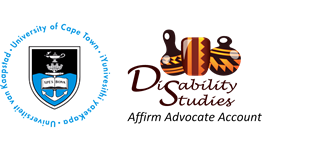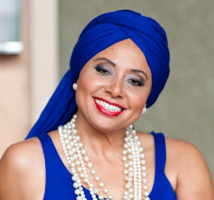
Biographies
Ncediwe Mdlulwa

I have obtained a Bachelor of Social Sciences with majors in Psychology and Organizational Psychology. I am currently enrolled for Postgraduate Diploma in Disability Studies at the University of Cape Town.
I am a non-disabled person but having been a student in the Postgraduate Diploma in Disability Studies (soon to be a graduate) has given one tremendous and in depth knowledge and understanding of the various environmental and attitudinal barriers that are imposed on people with disability which they also encounter in their everyday lives. I have also had exposure to both previous and current disability and the development experience as a result of previously work of being a Graduate Intern in the Department of Local Government under the Directorate Public participation under Sub directorate Unit: External Human Rights and Special Projects. This unit had a particular focus of mainstreaming in the designated groups such as disability, gender, youth development, HIV/AIDs and children. It is important to highlight that this unit had given one the exposure and realization that disability is a Human Rights and Developmental issue. This is where I discovered that the Postgraduate Diploma in Disability Studies which I embarked on.
Finally, in the past I have volunteered in the Intellectual Disability Service for one on one meetings hosted in Cape Town by the Lenteguer Psychiatric Hospital. Therefore, it is also important to note that apart from these experiences, I personally have an aunt with intellectual disability. Thus, it always saddens me that people with disability are not treated fairly yet they are like any other person before their disability. Thus, I am enthusiastic to work and connect with people, as a result of having studied psychology which is defined as a study of human behaviour, mind and attitude.
Marlene Le Roux

Marlene Le Roux is a CEO at Artscape. In this capacity she endeavors to close the divide that exists due to the legacy of our Apartheid history. She goes to great length to bring people to the theatre, and when that proves difficult she takes the theatre, in the form of a fully-fledged production to the rural areas and the communities.
One would think that these tasks take most of her time but Marlene still makes the time to be involved in many other projects outside of her day job. She is a motivational speaker and speaks out for the rights of women children and the disabled. She is not shy to speak her mind and remains true to any cause which she passionately and vigorously tackles. Conceptualized and edited a book on women with disabilities called “Look at Me” published by Genugtig (2008). It’s in essay and photographic form. Recently compiled a book on the icons of Mitchell’s Plain entitled “Place in the Sun” The idea behind this publication was to try and counter the negative stereotyping of people of colour in particular. Mitchell’s Plain’s being a suburb built outside of the city in the Apartheid era exclusively for people of colour. This book has served as an inspiration to not only the people of Mitchell’s Plain giving hope to young people of the area, but has sparked a much wider interest. The sale of the book will be donated to the Mitchell’s Plain Trust Fund, making the result of this project even more far reaching.
Chantal Brinkman

I obtained my first degree in Psychology at the University of Namibia in 2005 and then went on to work for Standard Bank Namibia in various departments. In 2009, I was offered a position at Lifeline Child Line Namibia to work on a special project that dealt with child trafficking across the Namibian and Angolan border. At the same time the University of Cape Town accepted my application to study towards a Bachelors for Social Work, I chose to study further.
My experiences and interactions throughout my Social Work Degree made me uncomfortably aware of how little we were being taught about disability and disability issues, factors that are a part of our everyday lives and the societies in which we live. This prompted my decision to do my postgraduate diploma in Disability studies as I felt I was lacking in skills and knowledge to assist in any form with regard to disability and disability issues, something I do not for a moment regret. It is my hope that in future I can take what I am learning now and use it to enhance tertiary level Social work education through the inclusion of Disability and Disability issues in extensive courses which will be offered in the Social Work stream Curricula.
Jane Harrison

Jane Harrison a current Masters student at the University of Cape Town, is the eldest of 2 children born to Deaf parents. Being able to hear, speak, and born at a time when people were less knowledgeable on the challenges of the disabled she became the extended ears and mouthpiece to her parents and other members of the Deaf community. At age four, she took on the role as an interpreter for her family. It was at that young age and during the course of her life that she gained knowledge on the challenges faced by persons living with disability.
Disability has been a huge part of her life; her upbringing and experience formed the basis of her perseverance towards working with the disabled. After facing numerous difficulties growing up she dropped out of high school. Her passion to drive change within her own circumstances and that of others, led her to complete her studies and she went back to school 18 years later.
Having being chosen as one of the participants in the OER project is both humbling and exciting. She looks forward to working along with the rest of the team in not only highlighting the challenges of persons with disability, but also highlighting the resilience shown by persons with disability over the years. It is important that people with disabilities are included on the planning and implementation of policies thereby giving recognition to the experiences of people with disabilities. It is important for people with disabilities to take ownership and a leadership role within projects so as to ensure that their voices and opinions are being filtered through. Their insight is vital if we are to promote and protect their rights.